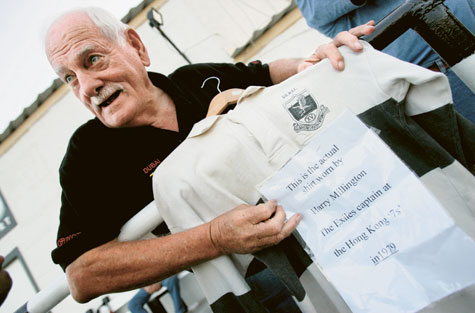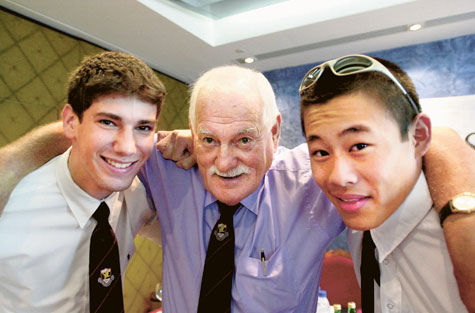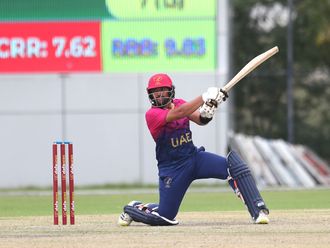
Dubai: It's a little known, or at least seldom acknowledged fact, that behind the success of the annual Emirates Airline Dubai Rugby Sevens, lie Dubai Exiles Rugby Club and their former chairman Jim Lees.
But while the former has risen to global prominence as one of the best organised events on the IRB World Sevens circuit. the other two have faded into relative obscurity.
Lees, aged 81, a former RAF maintenance conscript and quarryman from Oldham in England, emigrated to Ras Al Khaimah back in 1978 to work in the local cement industry.
Already a veteran sportsman by then at 48-years-old, Lees had been a keen rugby league player with Oldham, Buxton, Saddleworth and later North Pertherton. He also turned out as a footballer for Stockport County, once attracting the gaze of Everton scouts aged 26.
Unable to simply turn the page on those halcyon days, Lees first resurrected a flailing rugby side in Ras Al Khaimah and then filled in for Dubai Exiles, for whom he continued to play for up until four years ago, aged 77. As a result he remains one of the oldest and longest serving Dubai Sevens players on record.
However, his contribution to the game locally surpasses his ability as a prop or fly-half and extends more into the realms of sporting governance.
The Exiles were formed in 1968 and were easily the first rugby club to have laid their foundations in the UAE, set up by British servicemen.
Sand pitch
At that time they played on a sand patch near the Ramada Hotel but were then gifted a plot in Al Aweer by the late Shaikh Rashid Bin Saeed Al Maktoum, the former ruler of Dubai, after telegraph poles suddenly appeared on their pitch overnight.
"Land was awarded back then on the pretense that you would develop it and use it to sell Dubai to the world and the Exiles arguably did more to sell Dubai than anyone," said Lees.
From these small beginnings in Al Aweer, neighbouring the Country Club and Darjeeling Cricket Club, Lees, with the help of his friends in construction and engineering, took the club on the steepest incline in its history.
By the time Lees turned from a regular player and committee member to chairman in 1994, the club had installed two grass pitches and had built a clubhouse and concrete grandstand — all either on a shoestring or for free, thanks to contacts in the industry.
Blood donation
To balance the books, players would queue up outside Rashid Hospital to give blood and split the Dh200 proceeds with the club. "The friends we forged then have remained lifelong," said Lees.
The venue continued to host the Dubai Exiles Rugby Sevens, which had started in 1969, drawing crowds of 15,000. Now it attracts 50,000 per day.
Teams from all over the world would flock to compete even then. As well as sporting celebrities, the venue also played host to the rock band Aerosmith.
"We had built a legitimate business using trade licences, we got on well with the authorities and made money for our sponsors as well as the club and the development of rugby locally — it was marvellous," Lees said.
Around the burgeoning Sevens event, Exiles would also welcome incoming Naval sides and armed forces on tour for one-off matches. The ground and club became such an institution that it was even consecrated and ashes of past members were scattered there.
Inspection
With the club having grown the game in the region arguably above and beyond the likes of the AGRFU, which was founded in 1974, the IRB came to inspect the ground in 1996 and discuss the possibility of Dubai hosting the quarter-final of the Sevens World Cup there.
Emirates Airline, already a supporter of the game, came on board fully as title sponsor, once the inspection passed with flying colours. The quarter-final headlined the regular Exiles Sevens event.
The Exiles continued to invite teams and largely organise the tournament (which turned into a leg of the Sevens World Series in 1999) from the bottom-up, while the IRB controlled the main event, despite some interference, Lees felt, from the AGRFU.
"They were trying to be something they weren't. We had had 20 years or more experience of organising this and we had the contacts," said Lees.
Land acquired
With a committee assembled of specialists in every field from law to engineering and accountancy, the club maintained its stamp on the tournament up until 2005 when Lees quit as chairman and the Exiles land was acquired for development purposes.
During this time, Emirates had already begun work on their current Sevens facility on the Al Ain road. The Sevens World Series naturally moved there and with it a golden chapter in the history of rugby in Dubai came to an end.








